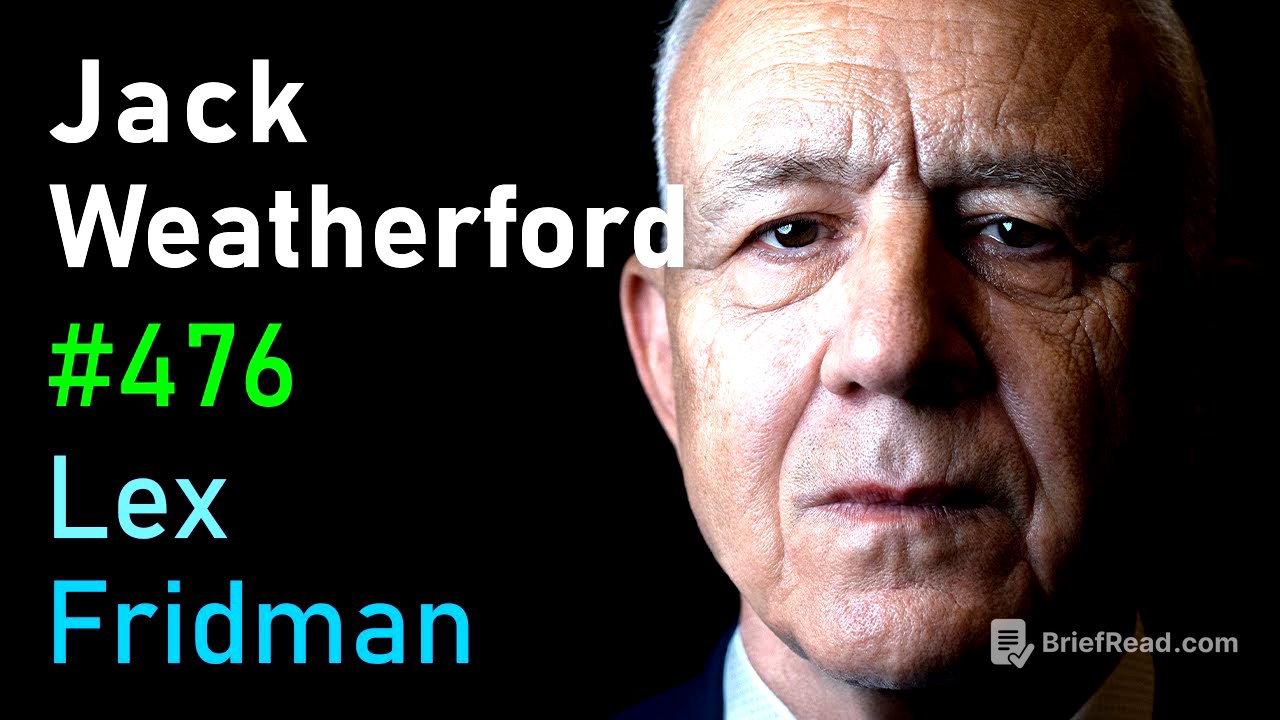TLDR;
This conversation with Jack Weatherford explores the life, conquests, and legacy of Genghis Khan, challenging conventional views and highlighting his impact on the modern world. It covers his childhood, military strategies, empire administration, religious tolerance, and the genetic legacy, offering a nuanced perspective on a complex historical figure.
- Genghis Khan's early life was marked by hardship, abandonment, and tribal violence, shaping his distrust of kinship and Mongol traditions.
- His military genius lay in efficient coordination, innovative tactics, and the ability to integrate foreign technologies, leading to the creation of the largest contiguous empire in history.
- Genghis Khan's empire promoted religious freedom, trade along the Silk Road, and a unified legal system, fostering cultural exchange and economic growth.
- Despite his brutal conquests, Genghis Khan's legacy includes progressive ideas and policies that influenced later societies, including the concept of individual religious freedom.
Introduction [0:00]
Jack Weatherford, an anthropologist and historian specializing in Genghis Khan and the Mongol Empire, is the guest. He is the author of "Genghis Khan and the Making of the Modern World" and other books on related topics.
Origin story of Genghis Khan [0:56]
Genghis Khan's story begins with the dramatic kidnapping of his mother, Erlun, by his father, Yasuk. Yasuk, while hunting, saw Erlun, a new bride, and seized her with his brothers. Erlun's husband fled, and she was taken, marking the start of a lineage filled with feuds and issues that would extend far into the future.
Early battles & conquests [42:42]
Timujin was born into an unusual situation as the son of a kidnapped woman. He was named after a Tatar warrior his father killed. His early life was marked by abandonment, including being left behind by his family and later being enslaved. At age eight, his father took him to find a wife but left him with another family after an instant connection formed between Timujin and a girl named Bura. On the way home, his father was poisoned by Tatars.
Power [55:23]
After his father's death, Timujin's clan abandoned his family, leaving them to struggle for survival. His mother, Erlun, worked hard to feed her children. Timujin was kidnapped and enslaved, but he escaped by using his wooden collar as a weapon. These experiences shaped his view that kinship was not trustworthy.
Secret History [57:45]
Timujin's childhood was marked by tribal violence, with raids for women, horses, and valuables being common. He later outlawed the kidnapping and sale of women. At 16, he married Bura, but she was soon kidnapped, leading him to seek allies to rescue her.
Mongolian steppe [1:11:10]
Timujin sought help from Wang Khan and Jamuka to rescue his wife, Bura. Jamuka, a childhood friend, joined Timujin in the rescue effort. They successfully rescued Bura, marking Timujin's first full-on military engagement.
Mounted archery and horse-riding [1:14:27]
Timujin killed his older half-brother, Bectar, due to power struggles and mistreatment. This act demonstrated his willingness to resolve problems through any means necessary. After rescuing Bura, she became pregnant, leading to questions about the child's paternity. Timujin defended his wife and accepted the child as his own.
Genghis Khan's army [1:22:48]
Timujin and Jamuka renewed their vows of being "anda" (more than friends), but later separated due to Jamuka's overbearing nature. Timujin remained loyal to Wang Khan, but eventually, conflict arose, leading Timujin to flee. He later defeated Wang Khan and took the title of Genghis Khan.
Military tactics and strategy [1:39:00]
Jamuka switched loyalties to the Nimon people but deserted them when Genghis Khan attacked. He was eventually captured by his own people and offered to be killed without shedding blood, becoming a protector for Genghis Khan and his people. Genghis Khan valued loyalty and understood the need for complete trust among his followers.
Wars of conquest [1:51:24]
Genghis Khan's military success stemmed from his ability to adapt and innovate, embracing new technologies and strategies. He understood the importance of loyalty and trust among his soldiers. He organized his army using the decimal system and emphasized self-reliance and discipline.
Dan Carlin [1:55:48]
Genghis Khan utilized psychological warfare, cultivating a reputation for ferocity to weaken his enemies. He offered towns the opportunity to surrender peacefully, but betrayal was met with severe consequences. The most drastic slaughters occurred when agreements were broken.
Religious freedom [2:05:49]
Genghis Khan implemented a policy of religious freedom, granting individuals the right to choose their religion. This policy gained him support from various minority groups. He explored different religions and organized public lectures and discussions among religious leaders.
Trade and the Silk Road [2:21:36]
Genghis Khan raised the status of merchants and guaranteed their protection, fostering trade along the Silk Road. He established rest houses and recuperation centers for merchants. This facilitated the exchange of goods, ideas, technologies, and scientific information between the East and the West.
Weapons innovation [2:30:21]
Kublai Khan, Genghis Khan's grandson, adapted military strategies to conquer South China. He utilized naval warfare and siege tactics, employing catapults on ships. He also recognized the importance of water and boats in warfare.
Kublai Khan and conquering China [2:31:52]
Kublai Khan unified China but faced challenges in maintaining control over the vast empire. He implemented a policy of mercy and incorporated defectors into his army. He attempted to invade Japan but failed due to weather conditions and tactical errors.
Fall of the Mongol Empire [3:13:43]
The Mongol Empire weakened due to internal reasons and external factors such as the great plague. The empire fragmented, with different regions becoming more independent. The Mongols were eventually overthrown in China, but they returned to Mongolia, maintaining their cultural identity.
Genetic legacy [3:40:38]
A 2003 paper suggests that 0.5% of the world's male population are direct descendants of Genghis Khan. While the methodology has been questioned, the idea is that it was of high social status value to be associated with the lineage of Jangghis Khan.
Lessons from Genghis Khan [3:50:32]
Lessons from Genghis Khan include religious freedom, protection of diplomats, and promoting people based on ability. He had a global vision and a willingness to learn from mistakes. He also emphasized the importance of protecting the environment.
Human nature [4:00:48]
The speaker expresses a love for individuals but a suspicion of institutions. He admires Genghis Khan's ability to destroy institutions and bring them to heel. He also values the Mongolian people's connection to their land and their ability to live in harmony with nature.
Visiting Mongolia [4:03:58]
Visiting Mongolia offers a chance to experience a culture that has remained largely unchanged since Genghis Khan's time. The speaker recommends visiting different regions of Mongolia, each with its unique landscape and cultural traditions. He also emphasizes the importance of respecting the Mongolian people and their traditions.
Lex: Dan Carlin [4:23:27]
Dan Carlin's "Hardcore History" podcast is recommended for its coverage of Genghis Khan and the Mongols. Carlin's idea of historical arsonists, figures who cause immense destruction but also pave the way for new developments, is discussed.
Lex: Gaza [4:26:17]
The speaker expresses his view that what is happening in Gaza is an atrocity and that the Israeli government is directly responsible for it. He calls for an end to the violence and emphasizes the importance of protecting children. He also reflects on the consequences of moral failings and the need to build a better future world.







![[EXPLAINED🍄] AI Agents vs. Workflows](https://wm-img.halpindev.com/p-briefread_c-10_b-10/urlb/aHR0cDovL2ltZy55b3V0dWJlLmNvbS92aS94cWNsOWRBQWtDMC9ocWRlZmF1bHQuanBn.jpg)

